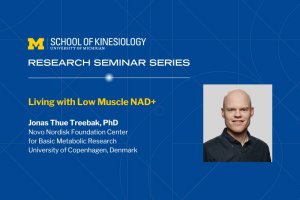Presented By: School of Kinesiology
Guest Speaker: Jonas Thue Treebak

Jonas Thue Treebak, PhD
Novo Nordisk Foundation Center for Basic Metabolic Research
University of Copenhagen, Denmark
Dr. Treebak will speak on, "Living with Low Muscle NAD+."
Wednesday, May 22, 4:00-5:00pm in SKB 3600. Light refreshments served.
Abstract: NAD+ is an abundant metabolite in all mammalian cells. It is important for generating cellular energy (i.e., ATP) and it is involved as a substrate in key metabolic pathways regulating how cells adapt to metabolic stress. NAD+ is generated from Vitamin B3s such as nicotinamide and nicotinic acid depending on the specific tissue. The rate-limiting enzyme for generating NAD+ from nicotinamide in all cells is nicotinamide phosphoribosyltransferase (NAMPT), and in the past years, we have established a fundamental role of Nampt for maintaining metabolic health in mouse skeletal muscle, liver, hypothalamus, and adipose tissue. Mice with a skeletal muscle-specific knockout of Nampt (SMNKO) have very low (>80% reduction) NAD+ levels, develop a centronuclear myopathy phenotype from around weaning age, and most mice died prematurely before 12 weeks of age. This phenotype is linked to an impaired integrity of the sarcolemma leading to an inability to properly regulate Ca2+ homeostasis within the muscle. On the contrary, mice where the knockout of Nampt is induced in the adult state (iSMNKO) have equally low NAD+ levels compared with the SMNKO mice, but they show preserved muscle mass and function both in vivo and ex vivo. In fact, skeletal muscle from iSMNKO mice have fully functional mitochondria that are not morphologically distinct from wildtype littermates, even on the molecular level. Moreover, iSMNKO mice do not appear to age faster as evidenced by analyses of the epigenetic muscle clock and MS-based proteomics analyses of young and 2-year-old mice. This seminar will present and discuss these and other data related to NAD+ metabolism in skeletal muscle from mice and humans.
Sponsored by the U-M Caswell Diabetes Institute and hosted by the School of Kinesiology
Novo Nordisk Foundation Center for Basic Metabolic Research
University of Copenhagen, Denmark
Dr. Treebak will speak on, "Living with Low Muscle NAD+."
Wednesday, May 22, 4:00-5:00pm in SKB 3600. Light refreshments served.
Abstract: NAD+ is an abundant metabolite in all mammalian cells. It is important for generating cellular energy (i.e., ATP) and it is involved as a substrate in key metabolic pathways regulating how cells adapt to metabolic stress. NAD+ is generated from Vitamin B3s such as nicotinamide and nicotinic acid depending on the specific tissue. The rate-limiting enzyme for generating NAD+ from nicotinamide in all cells is nicotinamide phosphoribosyltransferase (NAMPT), and in the past years, we have established a fundamental role of Nampt for maintaining metabolic health in mouse skeletal muscle, liver, hypothalamus, and adipose tissue. Mice with a skeletal muscle-specific knockout of Nampt (SMNKO) have very low (>80% reduction) NAD+ levels, develop a centronuclear myopathy phenotype from around weaning age, and most mice died prematurely before 12 weeks of age. This phenotype is linked to an impaired integrity of the sarcolemma leading to an inability to properly regulate Ca2+ homeostasis within the muscle. On the contrary, mice where the knockout of Nampt is induced in the adult state (iSMNKO) have equally low NAD+ levels compared with the SMNKO mice, but they show preserved muscle mass and function both in vivo and ex vivo. In fact, skeletal muscle from iSMNKO mice have fully functional mitochondria that are not morphologically distinct from wildtype littermates, even on the molecular level. Moreover, iSMNKO mice do not appear to age faster as evidenced by analyses of the epigenetic muscle clock and MS-based proteomics analyses of young and 2-year-old mice. This seminar will present and discuss these and other data related to NAD+ metabolism in skeletal muscle from mice and humans.
Sponsored by the U-M Caswell Diabetes Institute and hosted by the School of Kinesiology